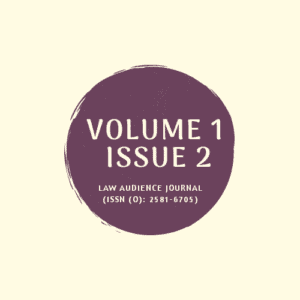CASE COMMENT WRITTEN BY: MS. NATASHA JAIN, LL.B, STUDENT AT NEW LAW COLLEGE, BHARATI VIDYAPEETH DEEMED UNIVERSITY & RESEARCH WRITER AT LAW AUDIENCE.
CASE NAME: INDIAN YOUNG LAWYER’S ASSOCIATION V. THE STATE OF KERALA & ORS WRIT PETITION (CIVIL) NO. 373 OF 2006
COURT: SUPREME COURT OF INDIA
DATE OF JUDGMENT: SEPTEMBER 28, 2018
INTRODUCTION:
The current case deals with an important aspect, i.e., “Entry of Women in Sabarimala Temple”. This case was filed in 2006 by the Indian Young Lawyer’s Association through public interest litigation (PIL) before the Hon’ble Supreme Court of India for challenging the Sabarimala Temple’s custom of not including women. The Association claimed that the rights of female devotees are violated under Article 14[1] of the Indian Constitution that is right to equality and freedom of religion under Article 25[2] of the Indian Constitution. The Sabarimala Temple is situated in the Periyar Tiger Reserve in the western ghat mountain ranges of Pathanamthitta District, Kerala. This temple is famous for Lord Ayyappa. It forbids the entry of women in their menstruating years that are between the ages of 10 to 50 years stated that it is a place of worship.
BACKGROUND:
The Sabarimala Temple is one of the most well-known pilgrimages place for Hindus. There was exclusion of admittance for women in the temple because Lord Ayyappa was a ‘Naishtika Brahmachari’ and according to the people who barred the women of menstruating age entry in the temple because women are not pure in that segment and it would encroach the celibacy of the idol. In 1991, the ban was challenged before the Hon’ble High Court of Kerala. The Court gave judgment in favor of the prohibitory and said that these restrictions are not discriminating to the Constitution. In 2006, the ban was opposed by the Young Lawyer’s Association appealing that rule 3(b) of Kerala Hindu places of public worship (Authorization of entry) Rules, 1965 states that “women who are not by custom and usage allowed to enter a place of public place shall not be entitled to enter or offer worship in any place of public worship’’. Later in 2018, the PIL was heard by a Constitutional bench including “The Former Chief Justice of India’’, Dipak Mishra.
FACTS:
A group of five women lawyers has challenged Rule 3(b) of the Kerala Hindu places of Public Worship (Authorization of Entry) Rules, 1965, which sanctions restriction on women “of menstruating age”. They moved the Apex Court after the Kerala High Court upheld the century’s old restriction and ruled that only the priest was empowered to decide on traditions. Senior Advocate Indira Jaisingh, who represented the petitioners, said the restrictions went against Articles 14[3], 15[4] and 17[5] of the Indian Constitution. She argued that the custom is discriminatory in nature and stigmatized women, and that women should be allowed to pray at the place of their choice. The Sabarimala Temple is one of Kerala’s most famous temples and it is dedicated to the worship of Lord Ayyappa, who is also referred to as ‘Dharmashashta’ or Lord of Dharma and is worshipped as a ‘Naishtika Bramhachari’ or a celibate for life. Therefore, as per a notification by the Devaswom Board that manages the temple, women belonging to the menstruating age are not permitted to enter the temple.
ISSUES:
- Whether the exclusionary practice which is based upon a biological factor exclusive to the female gender amounts to “discrimination” and thereby violates the very core of Articles 14, 15 and 17 and not protected by “morality” as used in Articles 25 and 26[6] of the Constitution.
- Whether the practice of excluding such women constitutes and “essential religious practice” under Article 25 and whether a religious institution can assert a claim in that regard under the umbrella of right to manage its own affairs in the matters of religion?
- Whether Ayyappa Temple has a denominational character and, if so, it is permissible on the part of a ‘religious denomination’ managed by a statutory board and financed under Article 290-A[7] of the Constitution of India out of the Consolidated Fund of Kerala and Tamil Nadu to indulge in such practices violating constitutional principles/ morality embedded in Articles 14, 15(3), 39(a)[8] and 51-A (e)[9]?
- Whether Rule 3 of the Kerala Hindu places of public worship (Authorization of Entry) Rules permits ‘religious denomination’ to ban entry of women between the ages of 10 to 50 years? And if so, would it not play foul of Articles 14 and 15(3) of the Constitution by restricting entry of women on the ground of sex?
- Whether Rule 3(b) of the Kerala Hindu places of public worship (Authorization of Entry) Rules, 1965 is ultra vires the Kerala Hindu places of public worship (Authorization of Entry) Act, 1965 and, if treated to be intra vires, whether it will be violative of the provisions of Part 3 of the Constitution?
HELD:
On 28th September, 2018 Supreme Court of India delivered its verdict in Sabarimala Temple Entry. A 4:1 majority held that the temple’s practice of excluding women is unconstitutional. It held that the practice violated the fundamental rights to equality, liberty and freedom of religion under Articles 14, 15, 19(1), 21 and 25(1). It struck down Rule 3(b) of the Kerala Hindu Places of Public Worship Act as unconstitutional. Rule 3(b) allowed for Hindu denominations to exclude women from public places of worship, if the exclusion was based on ‘custom’. The Former Chief Justice Dipak Mishra, Justice Nariman, Justice A.M. Khanwilkar and Justice Chandrachud constituted the majority stated that, “Women is not lesser or inferior to man. Patriarchy of religion cannot be permitted to trump over faith. Biological or Physiological reasons cannot be accepted in freedom for faith. Religion is basically way of life however certain practices create incongruities”. The dissenting opinion in the case was delivered by Justice Indu Malhotra. Former CJI Dipak Mishra said that religion is a way of life intrinsically linked to the dignity of an individual and patriarchal practices based on exclusion of one gender in favor of another could not be allowed to infringe upon the fundamental freedom to practice and profess one’s religion. He further stated that exclusion of women between the ages of 10 to 50 years practiced by the Sabarimala Temple denuded women of their freedom of worship, guaranteed under Article 25(1). He held that the devotees of Ayyappa did not pass the constitutional test to be declared a separate religious identity. He also held that if the Ayyappana are Hindus, the practice of excluding women cannot be held to be an essential religious practice.
CASE COMMENT:
In our society, since ages women had to struggle or fight for their equal position at public platforms. It is not about the representation, but is also about the ideological fight with the rules and customs in patriarchal society according to which women remain the subordinates. This case has been a fight against the patriarchal philosophy of the religious order which prohibits the entry of women into the temple. In the last three decades, the disputes and objections from different sections of the society has been resulted in the legal disputes. According to the author’s viewpoint, the decision which has been pronounced is correct and is for the equality of women in the society and this must be followed as per the direction of the Supreme Court.
CONCLUSION:
In India where essences of liberty and freedom are significant for the proper functioning of a perfect democracy, the individual and group rights both requires to be considered and the State must fulfill this gap. The Sabarimala case provided the Supreme Court with a chance to balance the gap between constitutional ideals and social reality. When we mention about the modifications, law remains the ultimate authority and thus constitutional alterations are important in societal reformations. In this regard, the judgment is radical and its approach to justify religious practices dominant in the Indian society. Along with this, it also confirms the individual freedom and safeguards the rights of the women in the society.
[1] Article 14 in The Constitution Of India 1949:
Equality before law The State shall not deny to any person equality before the law or the equal protection of the laws within the territory of India Prohibition of discrimination on grounds of religion, race, caste, sex or place of birth.
[2] Article 25 Freedom of conscience and free profession, practice and propagation of religion:
(1) Subject to public order, morality and health and to the other provisions of this Part, all persons are equally entitled to freedom of conscience and the right freely to profess, practise and propagate religion
(2) Nothing in this article shall affect the operation of any existing law or prevent the State from making any law
(a) regulating or restricting any economic, financial, political or other secular activity which may be associated with religious practice;
(b) providing for social welfare and reform or the throwing open of Hindu religious institutions of a public character to all classes and sections of Hindus Explanation I The wearing and carrying of kirpans shall be deemed to be included in the profession of the Sikh religion Explanation II In sub clause (b) of clause reference to Hindus shall be construed as including a reference to persons professing the Sikh, Jaina or Buddhist religion, and the reference to Hindu religious institutions shall be construed accordingly.
[3] supra note 1.
[4] Article 15: Prohibition of discrimination on grounds of religion, race, caste, sex or place of birth:
(1) The State shall not discriminate against any citizen on grounds only of religion, race, caste, sex, place of birth or any of them
(2) No citizen shall, on grounds only of religion, race, caste, sex, place of birth or any of them, be subject to any disability, liability, restriction or condition with regard to
(a) access to shops, public restaurants, hotels and palaces of public entertainment; or
(b) the use of wells, tanks, bathing ghats, roads and places of public resort maintained wholly or partly out of State funds or dedicated to the use of the general public
(3) Nothing in this article shall prevent the State from making any special provision for women and children
(4) Nothing in this article or in clause (2) of Article 29 shall prevent the State from making any special provision for the advancement of any socially and educationally backward classes of citizens or for the Scheduled Castes and the Scheduled Tribes.
[5] Article 17: Abolition of Untouchability:
Untouchability is abolished and its practice in any form is forbidden The enforcement of any disability arising out of Untouchability shall be an offence punishable in accordance with law.
[6] Article 26: Freedom to manage religious affairs Subject to public order, morality and health, every religious denomination or any section thereof shall have the right
(a) to establish and maintain institutions for religious and charitable purposes;
(b) to manage its own affairs in matters of religion;
(c) to own and acquire movable and immovable property; and
(d) to administer such property in accordance with law.
[7] As far as the funding aspect is considered, it is contended that prior to the adoption of the Constitution, both the Travancore and Tamil Nadu Devaswom Boards were funded by the State but after six years of the adoption of the Constitution, the Parliament, in the exercise of its constituent power, inserted Article 290-A vide the 7th Amendment whereby a sum of rupees forty six lakhs and fifty thousand only is allowed to be charged upon the Consolidated Fund of the State of Kerala which is paid to the Travancore Devaswom Board. It has been asseverated by the petitioners that after the insertion of Article 290-A in the Constitution and the consequent State funding, no individual ill-practice could be carried on in any temple associated with the statutory Devaswom Board even in case of Hindu temple as this constitutional amendment has been made on the premise that no ill-practice shall be carried on in any temple which is against the constitutional principles.
[8] Article 39(a): A Equal justice and free legal aid The State shall secure that the operation of the legal system promotes justice, on a basis of equal opportunity, and shall, in particular, provide free legal aid, by suitable legislation or schemes or in any other way, to ensure that opportunities for securing justice are not denied to any citizen by reason of economic or other disabilities.
[9] Article 51A. Fundamental duties It shall be the duty of every citizen of India (a) to abide by the Constitution and respect its ideals and institutions, the national Flag and the National Anthem;
51-A(e): to promote harmony and the spirit of common brotherhood amongst all the people of India transcending religious, linguistic and regional or sectional diversities; to renounce practices derogatory to the dignity of women.


